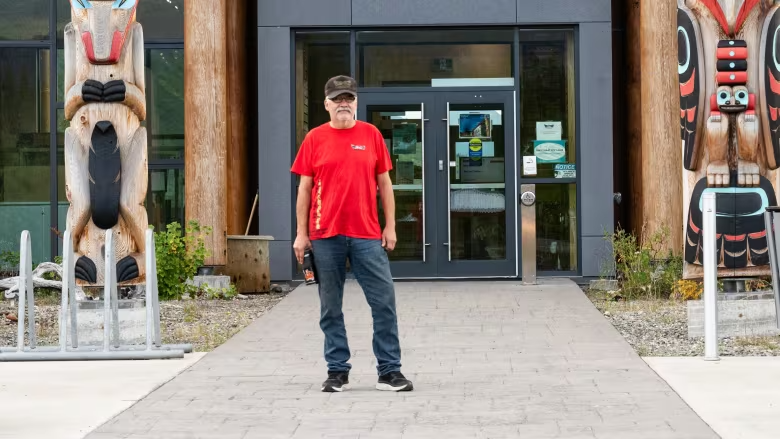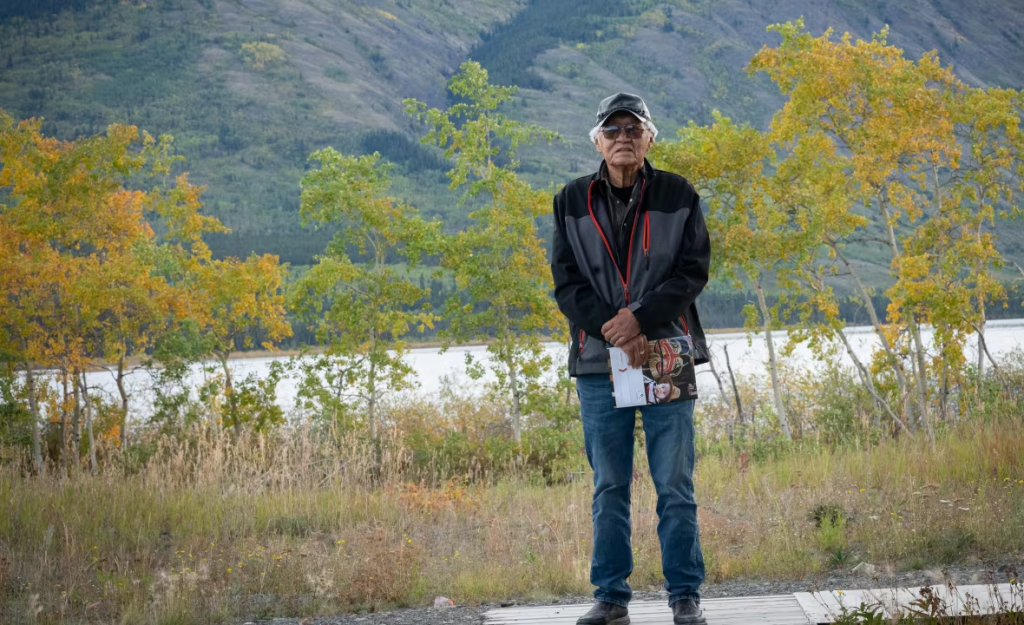Canada News
Recovery plan for Southern Lakes caribou hailed a ‘success story’ 31 years later

Danny Cresswell, a field operations manger for Carcross/Tagish First Nation spends most of his days out on the land, monitoring caribou and other wildlife. (Tori Fitzpatrick/CBC News)
First Nations working on new plan now to guide relationship with herds
About 30 years ago, Danny Cresswell was hunting for mountain goats alone on Montana Mountain in Carcross/Tagish First Nation traditional territory, when a figure came running toward him across the alpine.
The creature was unmistakable: it was a caribou, a lone member of the Carcross herd.
Cresswell had heard stories about this caribou — one that followed people as they traversed the mountain’s alpine. Sure enough, as Cresswell continued his hunt, the caribou followed him.
Cresswell’s encounter was a rare one at the time. The Southern Lakes caribou population had been declining for decades, making encounters like this one particularly remarkable.
“I don’t know why he was by himself, but he was sure curious about people,” Cresswell said. “He must have gotten separated, and was just lonely.”
A new relationship plan
Much has changed since Cresswell, now the field operations manager for Carcross/Tagish First Nation, encountered what he calls the “little lonely caribou on Montana.”
It’s been 31 years since six First Nations governments and biologists created the Southern Lakes caribou recovery program and now that the populations are recovering – they’re working on a new plan.
Those First Nations, along with the B.C., Yukon and Canadian governments have created a draft Southern Lakes caribou relationship plan. It’s open for public comment until the end of October, and it outlines how governments and communities in the Southern Lakes can continue to foster a reciprocal relationship with caribou.
It also proposes an approach to caribou hunting that hasn’t been settled on yet.
A key part of the recovery program established back in 1993 included a moratorium on hunting Southern Lake caribou, and that moratorium is still in place today. The Yukon government also closed all licensed harvests of Southern Lakes caribou.
A difficult decision
Patrick James was chief of Carcross/Tagish First Nation when the moratorium went into effect.
He played an integral role in protecting Southern Lakes caribou from the early days of the recovery program until his death on October 12, 2024. In his final days, James continued to go out on the land and was an advocate for teaching youth in the community about caribou.

A month before his passing, James reflected on the early days of the recovery program. He said the decision to stop hunting caribou was a difficult one, but it was rooted in the teachings that were passed to him by his elders.
“Our elders always tell us if you treat the land good, the land will treat you good,” James said. “Respect animals, respect the land. Those are some of the important things that we bring forward and pass on to our younger people.”
Recovery program a ‘success story’
Southern Lakes caribou include four herds of woodland caribou: Carcross, Ibex, Laberge and Atlin. The population is part of the larger Northern Mountain population, which was designated as one of special concern in 2014 by the Committee on the Status of Endangered Wildlife in Canada.
In 1993, the combined population of the four Southern Lakes herds was estimated to be 1,000 caribou.
As of 2019, the population had reached approximately 4,850 caribou. The dramatic population increase is a stark contrast to other woodland caribou populations in Canada, such as the Central and Southern Mountain populations in B.C. and Alberta, which, according to the committee’s 2014 report, have been declining for the past three generations.
Cresswell now gets to see caribou almost every day — and the feeling he gets each time never changes.
“It all feels good,” Cresswell said. “Just knowing that they’re there.”
Lars Jessup, project manager for the Southern Lakes caribou relationship plan, said the recovery program has been a “success story” so far.
“Probably the top reason is that we have had caribou populations grow in the last 30 years,” Jessup said. “Also, not least amongst the successes has just been the development of relationships among the partners, and the elevation of the profile of Southern Lakes caribou within communities across the Southern Lakes.”
Public outreach has played a role in protecting Southern Lakes caribou. First Nations game guardians spend time on the land educating hunters about why they should not hunt caribou, Jessup said.
“The focus of this [new] relationship plan is to try to build relationships between all the people that live here,” Jessup said.
Sacrifices made to protect caribou
But the program has not been without its challenges.
“We’ve got youth that haven’t hunted caribou for 30 years,” Cresswell said. “I mean, the generation has grown up without being on a kill site of a caribou or eating it.”
In the absence of caribou hunting, Cresswell has found new ways to teach youth about caribou. Some days, he brings a stuffed caribou and large garbage bags into classrooms for an interactive lesson.
“[We] tell the kids, you know, every caribou has got to eat one of those bags of lichen a day,” Cresswell said. “So [we] take them out and [say] ‘see how long it takes you to pick a garbage bag full of lichen in the winter time’. And kids, they just love the experience.”
Now that the Southern Lakes caribou population has recovered, both Cresswell and James said it’s time to take youth in the community on a caribou hunt.
“The government is willing to work with us,” James said. “There’s a whole generation of people that missed out on some important information that was passed on a continuous basis when we quit hunting caribou. They need that information passed on to them.”
The new draft relationship plan includes a proposed approach to caribou hunting, Jessup said. However, the steering committee has yet to make a final decision on that proposal.
“A lot of people feel very strongly that it’s not the time, and some people feel that we’re ready for that,” Jessup said. “The six nations who are leading the planning process, they thought long and hard on it, and would like the focus to remain on intergenerational knowledge transfer.”
Throughout his life, Patrick James made passing information to the next generation a priority.
“Our young kids out there, they’re forever wanting to learn something and it’s good if we can pass information on to them,” said James. “I hope that we continue working together…. Caribou is not only my relationship, it’s all our relationship.”





















